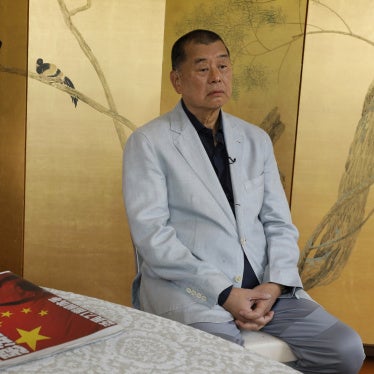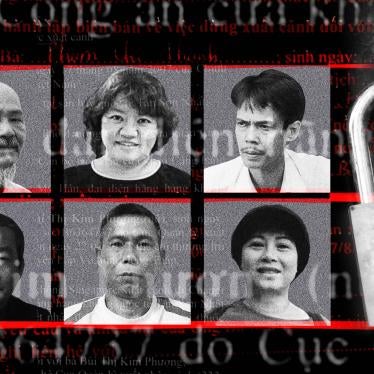(New York) – China should open Tibetan areas to independent monitors and journalists as a means of diffusing ethnic tensions and preventing violence on the eve of a string of politically sensitive anniversaries, Human Rights Watch said today.
One year after the largest Tibetan protests for more than two decades, the presence of such observers would serve as an incentive for good behavior for crowds, which have sometimes turned violent, and security forces, which have used disproportionate force and arbitrary detention as tools of ordinary policing.
February 25 marks the traditional Tibetan New Year, or Losar; March 10 is the 50th anniversary of the 1959 Lhasa uprising and the Dalai Lama’s escape to India; and March 28 marks the new central government-imposed “Serfs Emancipation Day.”
“Resorting to locking down Tibet isn’t merely a statement about the security situation there, it’s also an admission of failure by the government to effectively address key grievances,” said Sophie Richardson, Asia advocacy director at Human Rights Watch. “Relying exclusively on repressive policies will only lead to increased polarization and resentment, while further jeopardizing genuine stability across Tibet.”
In recent weeks, the Chinese government significantly increased the number of security forces across Tibet. Beijing tightened already highly limited access for international media, sealed off monasteries, and imposed sweeping restrictions on movement with the extensive use of arbitrary detention as a tool of enforcement and intimidation.
Foreign media have been effectively barred from freely reporting in Tibetan areas (with the exception of several government-organized and controlled tours) since protests by monks and violence in the Tibetan capital Lhasa in March 2008. In April 2008, the Chinese government turned down a request from the UN High Commissioner for Human Rights to visit Tibet on grounds that it was “inconvenient.” A separate appeal issued jointly by six UN special rapporteurs was similarly declined.
In Lhasa, the authorities have strictly implemented new measures issued in mid-January, which require the registration of temporary residents in the city. This process gives the police full discretionary power, and has resulted in arbitrary expulsion of non-permanent residents.
In addition, the Lhasa authorities have increased police operations aimed at identifying and detaining people who are suspected of either hindering the anti-separatism campaign or becoming potential protesters. These include former political prisoners and their families, minor offenders and temporary visitors. To process the large number of administrative arrests resulting from these heightened security measures, the authorities appear to have resorted to large-scale administrative detention outside of police stations and formal detention facilities.
One such facility, according to several reports from local residents received by Human Rights Watch, is a former military work unit on the outskirts of Lhasa currently housing hundreds of temporary detainees and several armed police forces units. Situated in Caigongtang Xiang (Tibetan: Tshal Gungthang), immediately east of Lhasa city, this large facility is reported to be holding people who are to be sent back to neighboring counties, prefectures, or the provinces of their household registration. One source said that people were being taken daily by the police to the train station or being told by the police that they will be held until after March for security reasons.
Satellite pictures examined by Human Rights Watch matched the description given by one eyewitness of large, walled facilities with several watchtowers overlooking rows of multi-storey buildings organized around a yard. No other independent confirmation could be immediately obtained given the current restrictions on movement in Tibet.
Human Rights Watch said that major obstacles to resolving tensions in Tibetan areas were the Chinese authorities’ overreliance on coercive measures and failure to uphold basic human rights standards – such as distinguishing between peaceful dissent protected under freedom of expression and assembly, and violent protest. Violent protest is not protected speech under human rights law, and the Chinese government has a duty to maintain public order and prevent harm to individuals. This duty, however, has to be carried out with due respect for fundamental human rights, including the principle of using the minimum force necessary in countering violent protests.
Human Rights Watch urged the Chinese government to respect the right to freedom of expression and information, and to facilitate access for media and human rights monitors who seek to enter areas where there are reasonable grounds to believe that violations of human rights or humanitarian law are being, or have been, committed. Provisions of China’s criminal code that criminalize peaceful dissent and expression, such as “inciting separatism,” contravene international human rights law.
“The Chinese government’s concept of what constitutes a national security threat needs to be drastically narrowed and brought in line with international standards,” said Richardson. “Ideologically driven ‘anti-separatism campaigns’ lead to serious violations of human rights and further polarize ethnic communities.”








